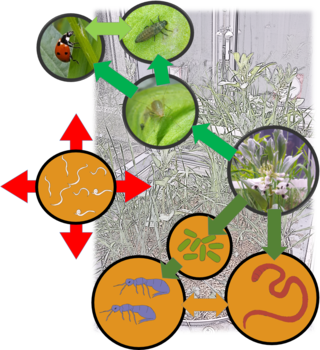2017 - Aphitron
The Aphitron study was conducted from early February 2017 to mid-July 2017 and aimed to investigate the ecosystem consequences of above- and belowground interaction network complexity. In this experiment, 12 EcoUnits were split in two fully separated sections (--> 24 independent subunits in total). In each subunit, two lysimeters - isolated from each other belowground, but connected aboveground - were each equipped with two herbs and two grasses, planted in monoculture patches, as well as one broad bean (Vicia faba) as phytometer. Both lysimeters were filled with sterilized soil and subsequently inoculated with bacteria, fungi, and nematodes. One of the two lysimeters was additionally equipped with larger decomposer organisms (earthworms and springtails). A low barrier with hook tape between the lysimeters prevented migration of soil fauna, while allowing aboveground organisms to move freely between plant stands. Besides soil fauna, the presence of herbivores (aphids) as well as the diversity and abundance of predator species (ladybirds) was manipulated.
This setup allowed to address various research questions, including:
- How does the interaction of decomposer diversity and predator density influence host patch selection in a specialist herbivore?
- How does the density of aboveground herbivores and predators affect the soil faunal community?
- How does spatial small-scale resource heterogeneity influence the behavior of generalist herbivores and their predators as well as associated ecosystem functions?
Besides, the Aphitron-Experiment was used to evaluate the functioning of the iDiv Ecotron, testing if all relevant aspects for addressing BEF-research in an above-belowground multi-trophic ecosystem can be realized. Notably, this experiment was the first test of host choice of generalist herbivores depending on aboveground and belowground community structure, and thereby integrated biodiversity-ecosystem functioning research with behavioral ecology.

